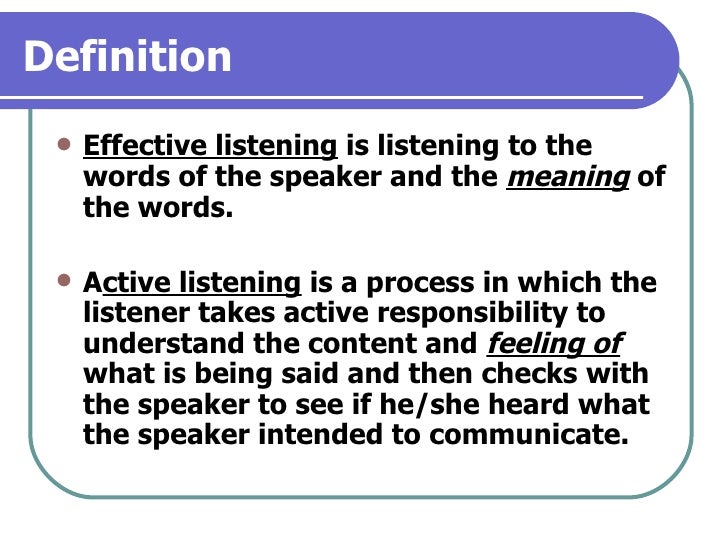
Sales reps who use active listening may notice that a customer’s objection to the price of your product is actually them expressing doubt this is the correct solution for them. They will look for elements used by a customer such as:īy effectively interpreting these, we are able to gain a deeper insight into what the customer is really trying to say. Tips: Focus on addressing the most important issues. Do not complete the speaker’s statements nor deviate from the subject.Active listening definition: active listening is the process of paying attention to, and interpreting the underlying message of, customer interactions.Īctive listening is an advanced listening technique where the listener – typically a brand representative – makes a conscious effort to look at all aspects of a conversation. Feedback: At this stage, you are still a listener and not the speaker.We’ve therefore isolated six additional skills below that a listener must learn to improve if they wish to increase their listening success. Evaluating: Here, you sort information and dissect them into facts and opinions, make your judgment on what is prejudice or what is exaggerated, which part was biased and what was the intent of the speaker’s message etc. However, these are not the only listening skills that a language learner must have to deal with, and the structure provided above may in fact not be used at all by a professor whose background is not in language teaching or EAP.Tips: Rehearse the main points in your mind. Memory pills or memory retention courses may be helpful. Main points must be absorbed into the long-term memory whiles trivial onesshould be discarded. Remembering: This is the stage where information is not only absorbed but retained also.Tips: Get yourself accustomed to the work-place-language(s) by learning the meaning of certain jargons, technical words, acronyms, sirens etc. Ask questions for clarity if necessaryand try not to stop the speaker in his tracks. Your ability to understand depends on various factors including language, knowledge etc. Understanding (Comprehension): The stage where you try to decipher the meaning of the message or sound you have just heard.Tips: If necessary, use hearing aids, naturopathic ear drops, oil drops or warm compressors for earaches. You may see an otolaryngologist for peculiar hearing problems. Pay attention to and gaze at the speaker or sound source to avoid visual distractions. Avoid multitasking when listening. Hearing problems such as earaches, surrounding environmental factors such as bright lights and funny commentsetc. Hearing or Receiving: At this stage, a lot of attention is required but anything that vibrates the eardrum can cause distractions, especially when it is a very loud sound.You can develop better listening skills by improving on the five stages of the listening processes. Enjoy smoother and faster revision of lesson notes.Enjoy an improved brain absorption rate.Learn faster and easily during on-the-job training.Pay attention and absorb information during speeches.Settle quickly into the working environment.

In 1937, Durrell and Sullivan developed a. Minimize the risk of error and deviation at work or school Thus most of the early listen- ing tests were designed to discover the relation between listening and verbal ability.Great listening skills will help the individual:

Unlike written communication, verbal communication has no documentation for referencing another reason why listening is of great essence. This is because verbal communicationsare used everywhere and more frequently than written ones, and it completes the chain of verbal communication. Listening is equally as important to a boss or employer as it is to an employee, a student or a teacher. Whiles students need to understand the teacher’s instructions to excel in exam, employees need to comprehend working instructions in order to function effectively. Whether at school, work, church or a public hearing etc., listening is of a universal importance. The stages in the listening process are: receiving (hearing), understanding, evaluating, remembering, and responding.Īs we will see later, this skill is worth mastering for maximum benefits in your career. Hearing is natural and reflexive whereas listening is a deliberate effort to comprehend sound that is heard. Hearing is the effect of vibrations in the eardrums caused by sound waves, but listening goes beyond this process. Everyone, except deaf people, hears but it is listening that makes the difference. Though it seems a simple natural activity, it is a skill that has not been mastered by many. 1intransitive to pay attention to someone or something that you can hear Listen 2intransitive listen (to somebody/something) to take notice of what.

It can be described also as the ability to pay attention to sound. Listening is the ability to comprehend verbally communicated information and providing appropriate feedback.


 0 kommentar(er)
0 kommentar(er)
